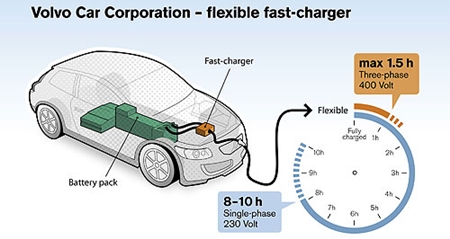Volvo Car Corporation is testing a new fast-charger for electric vehicles that it says operates six times faster than current onboard devices.
Along with the limited range leading to range anxiety, one of the biggest drawbacks of electric cars is the time it takes to recharge an EV’s battery pack.
Volvo claims its new system, which is billed as the world’s first three-phase onboard charger, will enable drivers to easily replenish battery power to give “more usable hours each day” and in turn make the electric vehicle industry “more viable as a commercial proposition”.
 Volvo C30 EV.
Volvo C30 EV.
As with most current-generation EVs, Volvo’s C30 Electric takes eight to 10 hours for its 24 kW/h lithium-ion batteries to be fully recharged from a typical domestic single-phase 240 volt 10 amp power outlet, depending on the available current.
A 15-amp ‘Level 2’ charging outlet can be installed by an electrician to lower charging times, while heavy-duty fast-charge three phase electrical outlets (Level 3/4) are available at select locations.
Volvo’s 22 kW ‘flexible’ fast-charger said to be the first onboard recharging system to operate on a three-phase supply, and is small enough to be fitted into an electric passenger car.
This allows the C30 Electric to be recharged with a three-phase 32-amp 400-volt outlet to achieve an 80 km range in a claimed 30 minutes, with a full charge taking 1.5 hours for 120-150 km.
This is so much better than the regular single-phase 230/240-volt household outlet that can recharge the Volvo C30 Electric in eight or more hours.
Volvo Car Corporation’s vice-president of electric propulsion systems, Lennart Stegland, said the fast-charging unit helps cure ‘range anxiety’ since the vehicle can be more easily recharged during the day. “We know that short recharging times and extensive operating range are a necessity for potential electric car consumers,” he said.
“The user can ‘top up’ the battery pack with electricity one or more times during the day. This means that the total daily range is significantly extended, yet with the same low operating cost compared to a car with a conventional powertrain.
“Giving customers more usable hours each day means that electric cars become more viable as a commercial proposition, in both the private and public sectors,” he said.
Volvo has produced around 250 C30 Electrics to test the technology and customer reaction in real-world conditions in several European countries, plus China and the United States. China, for example, expects to have 70 different EV’s from 35 manufacturers by 2020.
With Volvo’s C30 production scheduled to end at the end of this year at the company’s factory in Belgium, the constantly evolving technology – including the onboard fast-charge system – is expected to be transferred to a full-electric version of the forthcoming all-new V40.
However, the company is still to confirm a V40 EV project, leaving the longer-range V60 plug-in hybrid as its main commercial program in the electrified vehicle arena.




